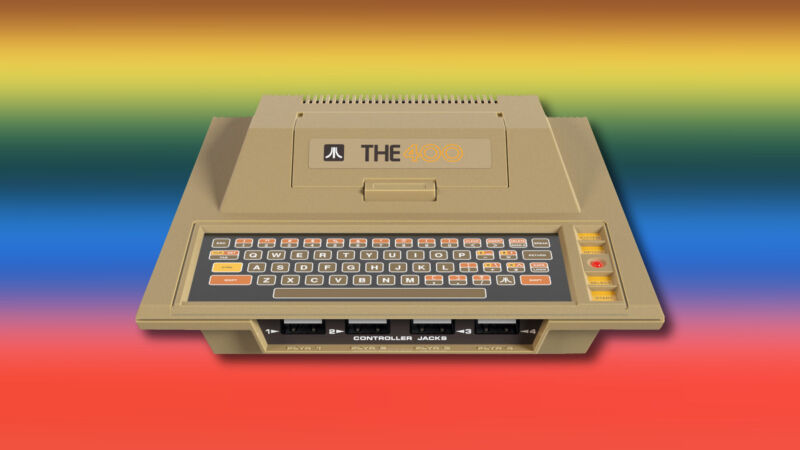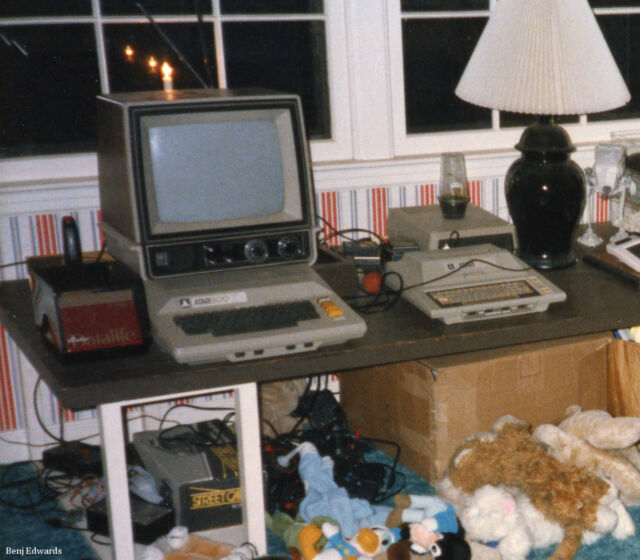
Retro Games / Benj Edwards
Last week, UK-based Retro Games, Ltd. announced a mini console version of the Atari 400 home computer, first released in 1979. It’s called “THE400 Mini,” and it includes HDMI video output, 25 built-in games, a USB version of Atari’s famous joystick, and it retails for $120. But this release means something more to me personally because my first computer was an Atari 400—and as any other Atari 8-bit computer fan can tell you, the platform often doesn’t get the respect it should. This will be the first time Atari’s 8-bit computer line has received a major retro-remake release.
My Atari 400 story goes a little something like this. Around the time I was born in 1981, my dad bought my older brother (then 5 years old) an Atari 400 so he could play games and learn to program. My brother almost immediately found its flat membrane keyboard frustrating and the Atari 410 cassette drive too slow, so my dad ordered an Atari 800 and an Atari 810 disk drive instead. This began our family’s golden age of Atari 800 gaming, which I’ve written about elsewhere.
I’ve often said if a modern game designer wants to learn how to make games, just dive into the Atari 400/800 game library. There are some priceless gems there you can’t find anywhere else, plus others that play best on the platform. OK, I’ll name a few: The Seven Cities of Gold, Archon, M.U.L.E., Wizard of Wor, Salmon Run, Star Raiders, The Halley Project, and so much more.

Even with the new 800, it seems that my dad must have kept the original Atari 400, because by the time I grew up more and wanted “my own computer” in the late 1980s, he gave me the Atari 400. The 800 was still my brother’s baby and typically remained in his bedroom. When I wasn’t playing more complex games like M.U.L.E. and Archon on the 800 with my brother, I hooked up the 400 to a small black-and-white TV set in my room and mostly played Galaxian, Pac-Man, and Donkey Kong on a cartridge. Not long after, I got an Apple II Plus and learned BASIC on that, but the Atari 400 always got pride of place in my growing computer collection.

But enough about me. Let’s talk about the new Atari 400 Mini. I haven’t used it myself yet, so all we have to go on is the information provided by the company—and the company’s reputation. Retro Games has previously released full-sized remakes of the Commodore VIC-20 and the Commodore 64, and mini consoles of the Amiga 500 and the Commodore 64. In 2020, Engadget gave the company’s “THE64 Mini” mixed reviews, praising its looks but complaining about its joystick and poor game selection. We’ll admit preconceived bias and hope the 400 Mini fares much better. Even if the joystick ends up a dud, Retro Games says you can provide your own USB stick or controller.
I also hope THE400 does well because Atari 8-bit fans have a tough time with group identity in the span of retro tech history. Few Americans aside from Atari 400/800 owners have heard of the platform (though the platform did very well in Eastern Europe). The Atari 8-bit series didn’t sell nearly as well as competitors like the Commodore 64 in the US (although Sean Lennon had an Atari 400 as a kid—cool trivia).
And even though the Atari 400/800 series provided the template for Commodore to imitate with the VIC-20 and C64, Commodore undercut Atari in price with cheaper parts, which contributed to Atari’s crash in 1983 and drove Texas Instruments out of the home computer business. More recently, the Commodore 64 has had several retro re-releases since the Commodore 64 Direct-to-TV in 2004. The Atari 400/800 platform has had none until now.

